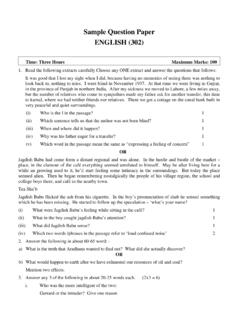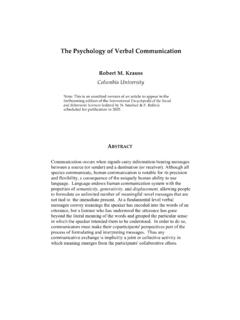Transcription of PSYCHOLOGY : UNDERST ANDING SELF AND OTHERS
1 PSYCHOLOGY : Understanding Self and OTHERS MODULE - I. Foundations of PSYCHOLOGY Notes 1. PSYCHOLOGY : UNDERSTANDING. SELF AND OTHERS . We often experience moods of anger and joy. We do have remarkable ability to learn and memorize poems, stories and events. We often notice powerful effect of leaders on the behaviour of followers. While interacting in groups we often experience conflict and cooperation. At times some of us suffer from depression, hyper-anxiety, etc. All of us remain curious to know about the causes of these happenings and try to make sense in our own ways. Our understanding is often based on beliefs and personal experiences which may not be true. The knowledge gathered in this way cannot be used to formulate theories or to solve problems faced by people in their lives. We need dependable and relatively accurate understanding of the principles describing the working of human mind and behaviour.
2 PSYCHOLOGY is the subject that provides insights into various aspects of human behaviour. In this lesson you will learn about the nature of PSYCHOLOGY , activities of psychologists and different branches of PSYCHOLOGY . OBJECTIVES. After studying this lesson, you will be able to: explain the need for the study of PSYCHOLOGY and nature of PSYCHOLOGY ;. describe what psychologists do;. state briefly the development of PSYCHOLOGY as a discipline;. state the relationship of PSYCHOLOGY with other allied disciplines; and describe the changing face of PSYCHOLOGY and different fields of PSYCHOLOGY . PSYCHOLOGY 3. MODULE - I PSYCHOLOGY : Understanding Self and OTHERS Foundations of PSYCHOLOGY NEED FOR THE STUDY OF PSYCHOLOGY . People hold a variety of expectations from the study of PSYCHOLOGY . Many of them are because of ignorance but some are also true. PSYCHOLOGY promises to help us Notes in understanding how various mental functions operate and how people behave in different conditions.
3 Its principles and theories are used in many situations. PSYCHOLOGY is relevant to solving teaching-learning problems in schools, problems in socializing children at home, motivating people in organizations and helping people to solve their emotional problems in personal lives. In addition, there are numerous human phenomena which require psychological theories and techniques. Selection of people for various jobs, assessing abilities and aptitudes of people, providing training for developing skills, setting goals and motivating people to achieve them and improving the style of life for better health are some of the very popular applications of PSYCHOLOGY . In brief, understanding the growth and development of a person or functioning of a group are important areas of psychological applications. Thus it is clear that the study of PSYCHOLOGY is needed to understand ourselves better in terms of the potentialities that we possess and shaping them in desired directions.
4 Such an effort is also done at the level of groups and organizations which represent human collectivities. In other words, a proper study and understanding of PSYCHOLOGY can help us understand ourselves and OTHERS better and enhance the quality of life. NATURE OF PSYCHOLOGY . How human beings receive information from environment and perceive objects? How people, learn and remember experiences? How do people think, reason and solve problems? How do they differ in various psychological characteristics like intelligence, personality and interest? How do people cope with various problems in life? A moment's reflection will make it clear that in all the above questions brain, mind or mental activities and behaviour are involved. Any observable action is an outcome of a coordination of brain, mind and behaviour. Brain has a physical structure whereas mind is considered a functional correlate of brain.
5 PSYCHOLOGY tries to understand the laws and principles characterizing the linkages across them in a scientific manner. 4 PSYCHOLOGY . PSYCHOLOGY : Understanding Self and OTHERS MODULE - I. Foundations of PSYCHOLOGY In our everyday life we behave in different ways and use the term 'behaviour' to refer to the verbal and physiological responses and actions. Interest in psychological issues has a long past. However, attempts to formalize the understanding of psychological phenomena in modern sense started only during Notes 19th century. It was influenced by the developments in the disciplines of philosophy as well as natural sciences. Today PSYCHOLOGY is considered as a science as well as a profession contributing to the improvement in quality of life. It focuses primarily on the study of various aspects of mental and behavioural functioning. Psychologists use scientific methods to understand the causes of behavioural phenomena and develop principles and theories about them.
6 They attempt to understand various questions related to human behaviour. In the course of its growth, in this century, PSYCHOLOGY has expanded in many directions and has encompassed almost all areas of human life. Thus we can say that PSYCHOLOGY is a scientific study of mind, brain and behaviour. WHAT PSYCHOLOGISTS DO? Many of us carry the impression that psychologists can read the face of a person and tell one's mental make up, may cure people suffering from mental abnormalities, can guess what is one's future, and can change one's mind instantaneously, like a magician. As we will see later, there is no magic in the hands of psychologists. A. psychologist uses certain procedures and tools to collect information and tries to draw inferences and conclusions about the probable causes of behaviour. Psychologists share twin goals: (1) understanding and explaining the complexities of behaviour, and (2) contributing to the improvement of the quality of human life.
7 The academic psychologists pursuing basic research are interested in the first goal. They try to test hypotheses about the diverse aspects of behaviour and mental processes. They develop principles, laws and theories using various methods such as observation and experimentation. They make efforts to describe, explain, predict and control behavioural phenomena. In contrast, the second goal is addressed by applied psychologists who are practitioners. They try to use psychological knowledge in solving various human problems. They are engaged in activities like counselling, therapy, personnel selection, career guidance, consultancy in organizational behaviour ( , team building, decision making, leadership training), consumer surveys, and psychological assessment and training in various skills ( communication , self presentation). Psychologists are now seen working not only in academic institutions doing research and teaching but also in institutions like hospitals, schools, industries, sports-complexes, military establishments, community centres and so on.
8 PSYCHOLOGY 5. MODULE - I PSYCHOLOGY : Understanding Self and OTHERS Foundations of PSYCHOLOGY INTEXT QUESTIONS Choose the correct alternative: Notes 1. PSYCHOLOGY is most appropriately defined as the: a. Study of mind. b. Scientific study of unconscious mental processes. c. Science of brain, mind and behaviour. d. Science of behaviour and knowledge. 2. Which one of the following is not used by psychologists? a. interview b. reading lines of one's palm c. experiment d. observation DEVELOPMENT OF PSYCHOLOGY AS A. DISCIPLINE. Understanding human nature has proved to be a major concern of human beings since time immemorial. The Indian thinkers had developed elaborate theories about consciousness, self, mind, mental activities since Vedic and Upnishadic period. The Indian thought systems like Vedant, Samkhya, Yoga, Buddhism, Jainism, Sufism, etc. have generated voluminous literature relevant to psychological processes.
9 Let us know that the scholars and terchers in Ancient India like Charaka the famous physician of first century AD, Vatsayan and Kautilya all provided the theoretical foundations to apply the Psychological principles. But there is a need to understand the concept in Indian context because social and cultural setting has its own influence on the development of PSYCHOLOGY . In the western world PSYCHOLOGY took the shape of a scientific discipline towards the end of 19th century. It is generally held that Wilhelm Wundt established the first psychological laboratory at Leipzig University in Germany in 1879. He was a pioneer and attracted a large number of students from different parts of the world who started expanding the discipline. Gradually the study of PSYCHOLOGY was organized around certain schools of thought. The main schools are as follows: 6 PSYCHOLOGY . PSYCHOLOGY : Understanding Self and OTHERS MODULE - I.
10 Foundations of PSYCHOLOGY Structuralism : Developed by Edward Tichener , it focused on the study of consciousness and its components, , sensations, images and affects. Functionalism : Developed by William James it focused on consciousness, memory, learning and emotions as related to survival, growth and adaptation of Notes living beings. Behaviorism : Developed by Watson it focused on the objective study of observable behaviour. Gestalt : Developed by Wolfgang Kohler, Kurt Koffka and their mentor Max Wertheimer this school focused on a holistic view and consciousness. Perception was the main area of study. Psychoanalysis : Developed by Sigmund Freud it gave importance to unconscious processes, conflicts, anxiety and disorders. The era of schools provided great opportunity for the diversification of PSYCHOLOGY . However, it was felt that none of them could explain psychological processes in totality.
















